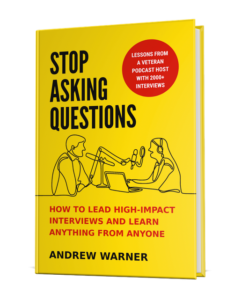
“Stop Asking Questions” is Andrew Warner’s book where he offers short lessons on how to be a good interviewer and podcast host. There are lots of great tactics that can be applied to everyday conversations. Here are my notes from each section:
4. What’s a win for you
Reassures the guest that you care about their needs, establishes trust
- What would make your team happy to hear us talk about?
- Why did you agree to do this interview?
- How can I make this interview as useful for you as it will be for me and my listeners?
5. Join the resistance
“I never failed” → “It’s amazing to talk to someone who always got everything right”
“I’m not a worrier” → “I don’t usually get to talk to people who are 100% confident”
6. Discover topics they crave
Look for shoved facts during the conversation:
“Sorry I’m late. When you go through a divorce, everything takes longer …”
7. Reciprocation
If only one side shares vulnerable information, they will feel resentment. If you want people to be open with you, you need to be willing to share first
8. Promotion stopper
You can use this phrase: “We’ll get to that, but first let’s finish talking about ….”
10. Because
Just ask “Because?” to let the guest elaborate
11. The dramatic lowball
I threw out a number that was absurdly low for her. I asked “Are you doing at least a million dollars in sales?” She shot back, “We’re doing 20 or 30 times that.”
I gave her a number that was almost an insult. Instinctively, she felt the need to correct the record.
12 . Share a higher purpose
Give the guest a mission they can buy into and support, examples:
- “Greg, I want to record an interview so good that decades from now when your great-great-grandkids wonder how you built your business, they’ll come listen to what we record today."
- “We both believe in pushing ourselves physically. I think I might be able to do my first solo 26.2 mile run, but I’m still at only 14 miles. Would you help me?”
13. Stop asking questions
Question after question sounds needy. Instead of asking “How did you get your first customer?” I said, “Tell me how you got your first customer.”
14. Put the words in someone else’s mouth
“What do you say to someone listening to us thinking, ”James is only happy now because he has money in the bank.“ I imagine someone listening to us thinking …. What would you say to that?”
15. Pre-ask the shocking before the interview
Would he mind if I asked him about it so he could address it?
16. A time when you
A lot of advice can sound cliche. But when you share advice through stories, it becomes memorable and actionable. Ask “Do you have an example of that?”
17. Stop asking most questions
Instead of asking “Who’s the most important person you hired?” I go with “Who’s an important person you hired?”
18. Use double-barreled questions
Double-barreled questions are questions that address two different issues. When reporters ask double-barreled questions, their subjects answer the easy part and ignore the part they don’t like.
“Is it inappropriate for me to ask …”
20. Sorry to interrupt
“I’m sorry to interrupt, but …”
21. Avoid train crashes
Have an emergency question ready like “What’s your motivation?”
“Listening to you, I can see you work hard. I have to pause and ask: what’s your motivation?”
22. Home run questions
The peak-end rule is a cognitive bias. Humans tend to remember two aspects of an experience more than anything else: the peak (i.e: most intense) and the end.
When an interview ended, I thanked them, and told them they did well, and mentioned one specific thing I liked from our conversation.
Pre-Interview
You might be tempted to send over a list of questions before the interview. I found that shortcut to be much less effective.
Interview Structure:
Hero’s Journey
(Asking reddit founder) “True of false” You guys saw that Digg was doing well and said, ‘Let’s jump on that bandwagon“
Joe Rogan’s style:
The host moves quickly through multiple subject areas, looking for what’s new and fascinating. “Forget about the flamethrower.” (switches subject)
Ask your audience: “I’m going to interview [whomever]. What questions should I ask them”
Stop looking for guests individually and instead look for sources of guests - search for idea fountains Interview idea fountain: “Companies acquired in the last 3 months” or “Amazon’s upcoming book section”
How to say No
When it’s time to say no, depersonalize it. Put the rejection in someone else’s mouth. Did you promise your sponsor you’d focus on a certain type of guest? Say so. If there’s no one else to point to, blame your higher purpose and guidelines.
“I admire what you have planned for your company, but when I interview founders of smaller companies, my audience complains and sends me angry emails. It’s not worth it for you and me to get that kind of treatment”
“In recent years my audience has complained when I feature investors instead of entrepreneurs”
Tools he uses:
- Descript [Editing Software]
- Semrush [which websites send people to my guest’s website to understand their marketing]
- Pipedrive [CRM]
- Sachit Gupta - creatorsmba.com
- Fusebox - audio player for your website
Not Giving Up
I couldn’t give up because I had already scheduled more interviews. I had to keep going because I’d already committed to interviewing them and others. The best way to ensure you keep going is to schedule interviews ahead of time. Let your commitment to another person drive you even when you doubt yourself.
